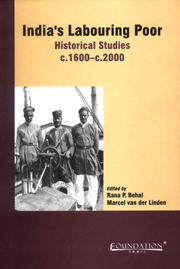Book contents
- Frontmatter
- Contents
- Notes on Contributors
- Frontispiece
- Preface
- Introduction
- Working Across the Seas: Indian Maritime Labourers in India, Britain, and in Between, 1600–1857
- The Brickmakers' Strikes on the Ganges Canal in 1848–1849
- On the Move: Circulating Labour in Pre-Colonial, Colonial, and Post-Colonial India
- Mobility and Containment: The Voyages of South Asian Seamen, c. 1900–1960
- Power Structure, Discipline and Labour in Assam Tea Plantations during Colonial Rule
- “Following Custom”? Representations of Community among Indian Immigrant Labour in the West Indies, 1880–1920
- Masculinity, Respect, and the Tragic: Themes of Proletarian Humor in Contemporary Industrial Delhi
- Stretching Labour Historiography: Pointers from South Asia
- DOCUMENT
- Select Bibliography
Masculinity, Respect, and the Tragic: Themes of Proletarian Humor in Contemporary Industrial Delhi
Published online by Cambridge University Press: 05 January 2012
- Frontmatter
- Contents
- Notes on Contributors
- Frontispiece
- Preface
- Introduction
- Working Across the Seas: Indian Maritime Labourers in India, Britain, and in Between, 1600–1857
- The Brickmakers' Strikes on the Ganges Canal in 1848–1849
- On the Move: Circulating Labour in Pre-Colonial, Colonial, and Post-Colonial India
- Mobility and Containment: The Voyages of South Asian Seamen, c. 1900–1960
- Power Structure, Discipline and Labour in Assam Tea Plantations during Colonial Rule
- “Following Custom”? Representations of Community among Indian Immigrant Labour in the West Indies, 1880–1920
- Masculinity, Respect, and the Tragic: Themes of Proletarian Humor in Contemporary Industrial Delhi
- Stretching Labour Historiography: Pointers from South Asia
- DOCUMENT
- Select Bibliography
Summary
INTRODUCTION
This essay will explore themes of proletarian masculinity (mardaangi) and humor (mazaak) arising from research amongst male migrant workers in a metalworking export factory in contemporary Delhi. The paper seeks to describe and critique metalworkers' vocabularies and practises of joking and horseplay, with particular reference to their homoerotic and heteroerotic imageries, as well as to their subtle auto-critiques. The paper attempts to view mazaak, despite its often vulgar, dualistic, and otherizing imageries, as an assertion of the erosic drive to affirm life, beyond the desire to merely survive, and contra the thanotic will to submit to the life-denying conditions of urban-proletarian existence. The paper probes the capacities and potentialities of certain styles of workers' mazaak, such as satirical and sarcastic humor (vyang), to critique exploitation, oppression, and associated dominant imageries of masculinity and work, and to suggest alternative visions and possibilities for proletarian inter-relations.
My research focuses on migrant workers working in a metal-polishing factory in the Okhla Industrial Area of south-east Delhi, exporting highend steel artware (cutlery, serving-ware, vases, display items) for sale in department stores and boutiques in America and Europe. The employment in the factory has varied from twenty to sixty workers, all male, from the states of Uttar Pradesh, Madhya Pradesh, Bihar, Jharkhand, and Kerala. The workers range in age from seventeen to fifty years, and are comprised of backward castes, scheduled castes, aadivaasis, Muslims, and Christians. Although a varying segment of workers are kept as casual workers, the majority of workers have been brought onto the company muster rolls, and receive statutory minimum wages (approximately $2.50 per day), along with Employees' State Insurance and Employees' Provident Fund.
- Type
- Chapter
- Information
- India's Labouring PoorHistorical Studies, 1600-2000, pp. 203 - 228Publisher: Foundation BooksPrint publication year: 2007
- 2
- Cited by



